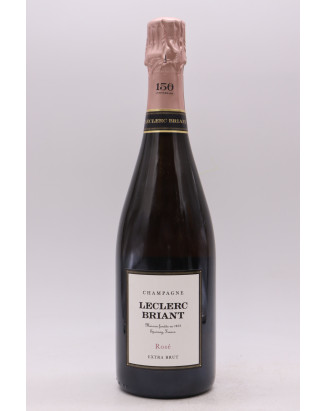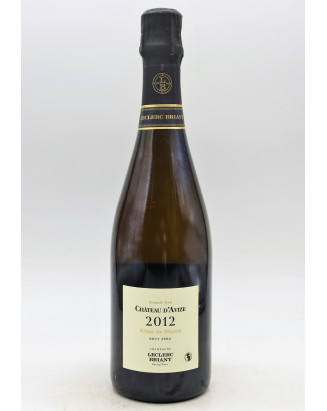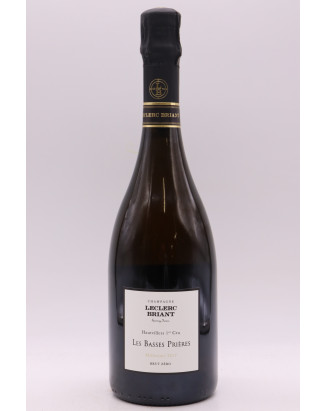









Champagne Leclerc-Briant was founded in 1872 by Lucien Leclerc in Cumières. From the outset, this Champagne house distinguished itself through its quest for excellence and respect for the land. In 1955, Bertrand Leclerc, the founder's great-grandson, and his wife Jacqueline Briant transformed the family estate into a trading house, giving birth to the famous Maison Leclerc Briant, now based in Épernay. Visionary and environmentally conscious, Bertrand Leclerc was one of the first to introduce organic practices in the 1960s.
The transition to biodynamics occurred in the 1980s under the guidance of Pascal Leclerc, Bertrand's son. His innovative approach positioned Leclerc-Briant at the forefront of organic champagne production, making it a pioneer in the region. In 2012, the estate was taken over by an American couple, Mark Nunnelly and Denise Dupré, who are passionate about French art de vivre. They breathed new life into the estate and entrusted its management to Frédéric Zeimett, a native of Champagne, ensuring that the house’s heritage and values were preserved and elevated to the highest level.
Terroirs play a central role in the production of Leclerc-Briant champagnes. The estate now cultivates 14 hectares of vines, most of which are classified as Grand Cru and Premier Cru, in renowned villages such as Mailly, Le Mesnil-sur-Oger, Hautvillers, and Cumières. This exceptional heritage is complemented by grape purchases from certified organic and biodynamic winegrowers, carefully selected for their shared values.
Leclerc-Briant's vineyard is a model of respectful viticulture, with organic certification achieved in 2004 and biodynamic certification in 2008. These practices, driven by a deep respect for nature, allow each plot to fully reveal its potential. The grape varieties used by the house include Pinot Noir (53%), Pinot Meunier (47%), and Chardonnay (100% for the white varieties), and each plot is carefully tended to express the uniqueness of its terroir.
Leclerc-Briant's winemaking philosophy is based on a non-interventionist approach. Under the direction of Hervé Jestin, a renowned oenologist with expertise in biodynamics, the house crafts its champagnes with the utmost respect for nature. Every step, from pressing to disgorgement, is carried out gently and naturally, allowing the wines to flourish without any artificial adjustments.
Fermentations occur spontaneously, often in a combination of stainless steel vats, oak barrels, and even clay eggs, promoting a pure and lively expression of the wine. The wines are aged for more than nine months, followed by a long maturation period in the house’s deep cellars, 35 metres underground. These ideal conditions ensure optimal ageing, giving rise to champagnes with great verticality and exceptional purity.
Another key aspect of Leclerc-Briant's style is the low dosage of its wines, often in the extra-brut category, which allows the cuvées to express their terroir without artifice. These champagnes appeal to connoisseurs with their tension, finesse, and unique character.
Leclerc-Briant offers a diverse range of champagnes, divided into three categories: Classics, Parcel Selections, and Specialities. Each cuvée reflects both the terroir and the harvest year, with an elegant style and distinctive energy.
Classics
Réserve Brut
Rosé Extra Brut
Millésime 2018 Extra Brut
Rosé de Saignée Extra Brut
Cuvée Divine Extra Brut in Solera
Cuvée Divine Demi-Sec in Solera
Parcel Selections
Les Monts Ferrés
Les Basses Prières 2017
Le Clos des Trois Clochers 2017
Specialities
150th Anniversary
Blanc de Meuniers 2016
Grand Blanc 2015
Cuvée Abyss 2018
Cuvée Abyss Rosé 2018
Among these cuvées, the Cuvée Abyss is particularly emblematic. This champagne is submerged for 12 months at the bottom of the sea, off the coast of Ouessant island, a technique that imparts a unique character to the wine, both saline and deeply energetic.
Some vintages not to be missed by enthusiasts and collectors include 2018, 2017, 2016, 2015, 2013, 2012, 2010, 2008, 2006, and 2004...
Champagne is a region rich with prestigious estates. Other notable houses and winemakers for champagne lovers to explore include Roederer, Bollinger, Jacques Selosse, Billecart-Salmon, and Pierre Paillard...
Champagne Leclerc-Briant is much more than just a Champagne house. It is an estate committed to pioneering biodynamic practices, embodying both tradition and innovation. Its cuvées reflect the authenticity of their terroir and the mastery of a craft that respects nature. Whether you are looking for a champagne for a special occasion or a gourmet tasting, Leclerc-Briant offers a unique experience, marked by elegance, complexity, and rare singularity.